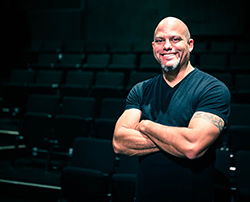News & Notices
David ‘Dstew’ Stewart: How USITT Got Me to the Guthrie
 David S. Stewart was perfectly happy as Academic Production Manager at Texas Performing Arts and UT-Austin when a friend suggested he apply for the production director job at the famed Guthrie Theater.
David S. Stewart was perfectly happy as Academic Production Manager at Texas Performing Arts and UT-Austin when a friend suggested he apply for the production director job at the famed Guthrie Theater.
He laughed. “I was like, ‘No way, they’ll want someone with regional theatre chops, not an academic.’”
Then the Guthrie’s Human Resource Director called and asked him to apply. A UT colleague said, “When the Yankees of theatre call, you pick up the phone.”
So he applied, still doubting they wanted him. “I felt they needed to prove they encouraged a diverse pool of candidates,” said Stewart, who identifies as bi-racial and black.
When he got the email inviting him to fly to Minneapolis for interviews, “I almost threw up on the spot,” he said.
Within days, Guthrie Artistic Director Joseph Haj called to say he was their No. 1 choice. Within weeks last fall, Stewart relocated to take a job beyond his dreams, while his wife and two teens are staying in Austin to finish the school year and sell their house.
Stewart, or “Dstew” as he’s known, said he’s still marveling at how he has risen from an academic production manager to this position at one of the nation’s top theatres.

DStew with Kasey Allee-Foreman & Madilynn Garcia at Oregon Shakespeare Festival in 2015
One thing he knows: “It’s a direct result of USITT and our Diversity Initiative,” he said. “I mean direct!”
Stewart, USITT Management Commissioner and newly elected to the USITT Board of Directors, grew up in Denver and found theatre after years of martial arts training took a toll on his knees by high school.
Because of that, he was able to substitute another class for gym. He heard stagecraft was an easy “A.” His teacher, John van Epps, became his first mentor. “Whether it was running sound or lights, he pushed me to do better,” he said. “And the theatre bug bit me.”
He went to Loretto Heights College for theatre tech, but the college closed abruptly his junior year. Luckily, a professor had contacts at Webster University in Missouri. Stewart and two pals “climbed into a car and drove across Kansas” to check it out.
Prof. Peter Sargent, now Webster’s Dean of Fine Arts and head of its Stage Management program, got him a financial package to finish school there. But he had to pick a specialty. The Repertory Theatre of St. Louis is on Webster’s campus, “so I got a chance to see what real designers were doing,” he said. “I said, ‘I’ll starve if I become a designer.’ I realized I was much better with people than technology. So when they said, ‘What’s your major?’ I said, ‘Stage Management.’ And that was it.”
As an SM, he had to challenge his introvert identity. He became what he calls, “an ambivert – an introvert who can present as an extrovert.” Between his “knack for wanting to take care of people” and his martial arts training, he commands a room better than many actors.
On graduating in 1990, he got the ASM job at St. Louis Rep, his equity card and a new mentor, Stage Manager Tom Martin, who provided his “graduate education in stage management.”
In the next few years, he also did summer stock at Little Theatre on the Square in Sullivan, IL, married his wife, Jenn, started a family, worked as SM at the Studio Arena Theatre in Buffalo, left theatre for three years for corporate project management, and went back in 2003 as Production Manager and head of stage management at the University of Wisconsin-Madison.
There he met visiting director Steve Rothman, who told him, “You should get involved in USITT.” Soon after, Stewart brought a show to Illinois State University for ACTFA, where David Grindle, now USITT Executive Director, was teaching a stage management class. They immediately connected, and Grindle told him, “You should get involved in USITT.”
“So I said, ‘OK, universe, I guess I should get involved in USITT.’”
In 2008 he volunteered for USITT’s Stage Management Mentor Project, then led by Jack Feivou, now USITT’s VP-Conferences and a close friend. At that Conference, he bonded with another USITT friend, Tayneshia Jefferson, who said, “David, you need to come with me.” She was chairing USITT’s People of Color Network. “There were seven people in the room,” he said. “I said, ‘I can get behind this.’”
Jefferson’s missions were to increase diversity in theatre production and mentor more students of color. In 2010, their friend David Grindle was hired as USITT’s first executive director, and asked Stewart to be VC-Programming for the management commission. USITT adopted diversity as a future goal. In early 2013, Jefferson won election to the USITT board on a platform of diversity.
A month after taking office, Tayneshia died suddenly of a brain aneurysm. She left a void at her university, Carnegie Mellon, and in USITT’s SMMP and growing People of Color Network. As memorial donations poured in to USITT, Grindle asked Stewart and board member Kasey Allee-Foreman to build a sustainable program in Tayneshia’s memory.
They created Gateway, USITT’s mentoring program for students from underrepresented groups in theatre production. They began in 2014 with three mentees, who were paired with professional mentors from similar backgrounds and fields. That expanded to 12 mentees and mentors in 2015 in Cincinnati, and this year there were 56 applicants for the 12 spots for USITT 2016.
Meanwhile, Stewart met another strong black female friend, Sharifa Johka, at USITT 2014. Johka, director of the FAIR diversity program at Oregon Shakespeare Festival, insisted that he present at the 2014 Theatre Communications Group (TCG) Conference in San Diego on the lack of diversity in the field of production.
At TCG, many realized that production was an absolute afterthought on the issue of diversity and inclusivity, catapulting USITT’s role as the leader in diversity efforts for production. In 2015, Stewart and Allee-Foreman participated in OSF’s first FAIR Conference, sparking a partnership between USITT and OSF’s FAIR program (Fellowships, Apprenticeships, Internships and Residencies). USITT also sent Stewart and fellow Gateway mentor Jim Streeter to the 2015 TCG Conference in Cleveland for a session on hiring for diversity in production.
This is where the threads of Stewart’s story come together. In the audience at TCG 2015 was Patricia Mitchell, executive assistant to Guthrie artistic director Joseph Haj. After hearing Stewart speak, she went back and recommended him to her boss for the Production Director job.
“So without USITT, without Tayneshia, and without Gateway, which puts me in touch with Sharifa, who insists I go to TCG, who invites me back to speak again, I would NOT BE HERE!” he said of his Guthrie job. “I find that mind-blowing.”
So would his friend Tayneshia. Dstew got the job Oct. 1. On Oct. 2, he posted on the ‘Remembering Tayneshia Jefferson’ Facebook page:
“Hey, Tay. I’ve been called up to the big leagues! I am now the Director of Production for the Guthrie! It is all because of you. I love you.”

